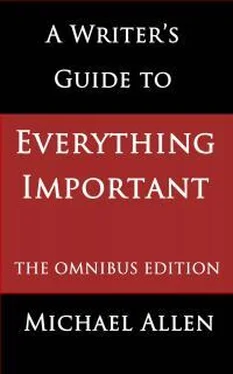Oh, and in the case of men: Presentable young ladies with bust measurements in excess of 34 DD should form an orderly queue outside my bedroom door from nine p.m. onwards.
Those who suffer from this kind of delusion seize upon expressionism to ‘justify’ their foolishness. For that reason alone, the theory is to be discouraged.
It is a remarkable fact that many of the consumers of all art forms have been successfully brainwashed by selfish and self-centred writers, actors, and other artists, over a long a period of time. Many members of the public are so bemused by the expressionist propaganda that they can be bullied into buying, and even admiring – albeit grudgingly – works of art which actually bore them stiff.
Deeply embedded into our puritanical, prudish little minds is the idea that there is something wrong with us if we do not appreciate a particular work which has been praised by ‘good judges’. And, conversely, we feel almost ashamed of ourselves if we happen to find something funny and moving when it is clearly popular and vulgar.
Professional critics and opinion-formers have largely encouraged the writers, musicians, and artists of all kinds to indulge their selfish and childish natures at our expense. As if they needed any encouragement!
I mentioned earlier my own teenage interest in jazz; and in the 1950s, in the tiny, inbred world of jazz, there was no greater insult than to say of a musician that he had ‘gone commercial’. Going commercial meant playing music which was specifically designed to entertain the general public, as opposed to playing music which expressed the torment of the performer’s soul – music which was appreciated, after a fashion, only by a minute clique. The sin of ‘going commercial’ was, in my view, entirely illusory.
I would like to encourage you, in your role as a consumer of art, to have a little more confidence in your own powers of appreciation, and to care a little less about the judgement of experts. And I speak as someone whose all-time favourite television programme is Nearest and Dearest , starring Hylda Baker and Jimmy Jewel. (This was, for the record, about as down-market a sitcom as could be imagined.)
I hope I have also persuaded you that a mature writer, with a properly modest view of her own importance in the scale of things, should concentrate upon the emotions and feelings of her readers, rather than spend her time fiddling about with her own obsessions.
The writer’s personal emotions are, of course, a data bank upon which she can draw. But it is not a guarantee of quality to be told that the writer, when working on her latest opus, wept tears so copious that the keyboard blew a fuse. Neither are we certain to laugh at something which the writer, herself, found so hilarious that she nearly fell off her chair.
Edith Wharton – once a famous writer but now largely forgotten – tells us in her book The Writing of Fiction that as she worked she constantly tried to bear in mind that her characters must be ‘living’ to her readers but not to herself. Precisely. Uzzell, in quoting this passage, adds that, unless a writer can remember this advice, ‘he will be the slave of his characters and not their master.’ In other words, if the writer is to be in control, then the preconceived emotional effect is what must determine the nature of the characters and the events which befall them. As Edgar Allan Poe pointed out 170 years ago.
In other books, and on my blog (the Grumpy Old Bookman) I have repeatedly made the point that a writer is most unlikely to make any serious money, and that those who seek literary reputation or fame are chasing worthless illusions. Given that state of affairs, all that remains as a benefit of writing is the satisfaction of doing the job well.
For that reason, many writers will choose to use material which is personal, which derives from their own experience, and which seeks to create in the reader the same sort of emotion as that experienced in life by the writer. That is one thing. But to go further, and to argue that expressionism of that kind is the only worthwhile and morally acceptable form of art, is quite another.
Which brings us, rather neatly, to the question of the morality of the novel, and, for that matter, of art generally.
19. The morality of the novel
To young readers, the morality of the novel may seem an odd topic. For a start, one seldom sees, these days, any sort of discussion of morality in the arts; it seems to be far too tricky a subject. This is probably the result of moral/value relativism – or some such. I seem to have heard something about this topic once or twice – younger chaps talking in a far corner of the common room, don’t you know.
Newspaper columnists and other guardians of public morality are, however, always ready to discuss one aspect of the novel: whether it’s too sexy for its own good, or anyone else’s. And on this topic, a little historical perspective will not be out of place.
In the nineteenth century, novels, like actresses, were often assumed to be wicked by definition. The poet Swinburne once gave a novel to a friend of his, Lady Trevelyan. And – Lord preserve us! – this book was not only a piece of fiction but it was a French novel at that! When the lady’s husband heard about this gift, he ran to the drawing room, picked up the offensive object with a pair of fire-tongs, and deposited it on the blazing coals.
Quite right too. Filthy chaps, those Frogs. You only have to think of French kissing, French letters, and so forth, to understand that the bounders are up to no good. I understand they eat snails as well.
A deep-seated belief that fiction was likely to deprave and corrupt, particularly in respect of sexual morals, persisted well into the second half of the twentieth century.
In the 1950s, English magistrates competed with each other for the title of twit of the year: works such as Boccaccio’s Decameron (written in the fourteenth century and famous ever since) were seized as obscene and destroyed. Even quite respectable publishers lived in genuine fear of going to prison.
The situation was perhaps worse in the United States. Younger readers of this book may be unaware that, fifty years ago, novels which now seem utterly harmless were then condemned as virulently dangerous: Peyton Place , for instance, caused an uproar when it first appeared in 1956. It was then labelled as sordid and cheap. But in the year 2002, this unspeakable novel was dramatised on BBC Radio’s Woman’s Hour .
Until 1960, the so-called four-letter words were not permitted to appear in print in England, and descriptions of sexual activity had to be shrouded in obscurity. In the cinema, no young Englishman so much as glimpsed a female nipple until... when? The late 1950s at least.
Eventually, however, attitudes changed. And I suppose it could be said that they changed quite quickly. For example, the city of Boston, in the USA, was at one time notoriously prudish. In the 1950s and ’60s, the proud boast ‘Banned in Boston’ was one which could be guaranteed to add to the sales of any book. But, by 1986, when I visited Boston, all had changed. There was one city block, known as the Combat Zone, on which were located a whole parade of hard-core porno bookshops, blue-movie houses, and strip clubs. All were extremely explicit. (Or so I was told. I never went in them myself, you understand. Well, only the once. And that was just for research. And I certainly didn’t enjoy it.)
If I have couched this discussion of morality in terms of sexual content, that is for the sake of simplicity. The point I am trying to make is that, in the quite recent past, novels (and many other forms of art or entertainment) were regarded with deep suspicion by the political, social and religious leaders of society.
Читать дальше












